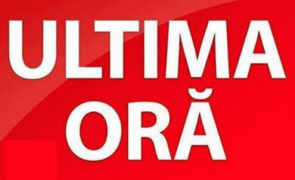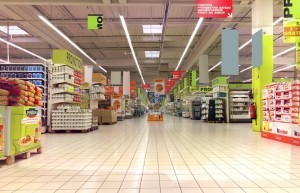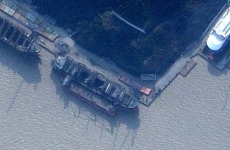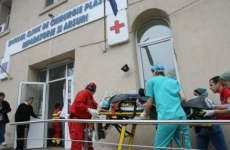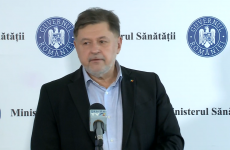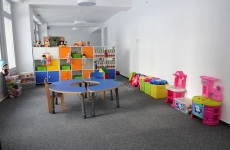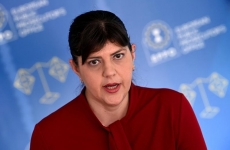Curtea Europeană a Drepturilor Omului (CEDO) s-a pronunţat, marţi, în legătură cu decizia pilot referitoare la situaţia din penitenciarele din România. Condiţiile de detenţie din penitenciarele din România contravin Convenţiei Europene pentru Drepturile Omului şi arată o disfuncţionalitate structurală care necesită adoptarea de măsuri generale de către stat, a decis marţi Curtea Europeană pentru Drepturile Omului. Astfel, România are la dispoziție șase luni pentru schimbări în legile penale.
În decizia publicată astăzi pe site-ul CEDO se arată că hotărârea Curții rămâne definitivă în trei luni de aici înainte, dacă România nu cere retrimiterea la Marea Cameră, după care curg cele șase luni pe care România le are la dispoziție să prezinte planul de măsuri. Așadar, România are la dispoziție nouă luni în total pentru a prezenta planul cerut de CEDO.
Sorin Grindeanu, reacție VIRULENTĂ: 'Am cerut ministrului MAI să sancționeze vinovații'
Până atunci toate cauzele pe această temă vor fi suspendate. Prin această decizie-pilot, CEDO a stabilit că a fost încălcat Articolul 3 al Convenţiei, care interzice tratamentele inumane sau degradante, în acest caz care vizează condiţiile de detenţie din închisorile româneşti, precum şi din arestul poliţiei. În decizie, CEDO nu impune României nicio măsură anume și nu spune nimic despre grațiere sau relaxarea politicii penale.
De asemenea, CEDO a decis ca România trebuie să plătească, în total, 16.000 de euro despăgubiri morale şi 1.850 de euro cheltuieli de judecată, după ce instanţa europeană a fost sesizată de Daniel Arpad Rezmiveş, Laviniu Moşmonea, Marius Mavroian şi Iosif Gazsi în legătură cu condiţiile din închisorile din România.
Un nou protest în fața Guvernului: Trafic dat peste cap două zile
Decizia Pilot a CEDO
Detention conditions in Romanian prisons are in breach of the Convention and point to a structural deficiency requiring the adoption of general measures by the State
In today’s Chamber judgment1 in the case of Rezmiveș and Others v. Romania (applications nos. 61467/12, 39516/13, 48213/13 and 68191/13) the European Court of Human Rights held, unanimously, that there had been: a violation of Article 3 (prohibition of inhuman or degrading treatment) of the European Convention on Human Rights. The case concerned the conditions of detention in Romanian prisons and in detention facilities attached to police stations. The applicants complained, among other things, of overcrowding in their cells, inadequate sanitary facilities, lack of hygiene, poor-quality food, dilapidated equipment and the presence of rats and insects in the cells. Under Article 3 (prohibition of inhuman or degrading treatment), the Court held in particular that the conditions of the applicants’ detention, also taking into account the length of their incarceration, had subjected them to hardship going beyond the unavoidable level of suffering inherent in detention. Under Article 46 (binding force and execution of judgments), the Court decided to apply the pilotjudgment procedure, finding that the applicants’ situation was part of a general problem originating in a structural dysfunction specific to the Romanian prison system. The Court held that the State should introduce: (1) measures to reduce overcrowding and improve the material conditions of detention; and (2) remedies (a preventive remedy and a specific compensatory remedy). The Court decided to adjourn the examination of similar applications that had not yet been communicated to the Romanian Government and to continue its examination of applications that had already been communicated. Within six months from the date on which the judgment became final, the Romanian Government had to provide, in cooperation with the Committee of Ministers, a precise timetable for the implementation of the general measures.
Principal facts The applicants, Daniel Arpad Rezmiveş, Marius Mavroian, Laviniu Moşmonea and Iosif Gazsi, are Romanian nationals who were born in 1970, 1966, 1976 and 1972 respectively. Mr Rezmiveş, Mr Moşmonea and Mr Gazsi, who are currently detained in Timişoara, Pelendava and Baia Mare Prisons, and Mr Mavroian, who was detained in Focşani Prison and was released on 13 January 2015, complained in particular of overcrowding, lack of space and poor hygiene
1. Under Articles 43 and 44 of the Convention, this Chamber judgment is not final. During the three-month period following its delivery, any party may request that the case be referred to the Grand Chamber of the Court. If such a request is made, a panel of five judges considers whether the case deserves further examination. In that event, the Grand Chamber will hear the case and deliver a final judgment. If the referral request is refused, the Chamber judgment will become final on that day. Once a judgment becomes final, it is transmitted to the Committee of Ministers of the Council of Europe for supervision of its execution. Further information about the execution process can be found here: www.coe.int/t/dghl/monitoring/execution.
2.conditions in their cells (presence of rats, mould on the walls, and so on), inadequate access to showers and toilets, a lack of natural light, poor ventilation, and the unsatisfactory quality of the equipment and food provided in the prisons in which they had been or were still detained.
Complaints, procedure and composition of the Court Relying on Article 3 (prohibition of inhuman or degrading treatment), the applicants complained of the conditions of their detention in Gherla, Aiud, Oradea, Craiova, Târgu-Jiu, Pelendava, Rahova, Tulcea, Iaşi and Vaslui Prisons, and in the Baia Mare police detention facilities. The applications were lodged with the European Court of Human Rights on 14 September 2012, 6 June 2013, 24 July 2013 and 15 October 2013 respectively. Judgment was given by a Chamber of seven judges, composed as follows:
Ganna Yudkivska (Ukraine), President,
Vincent A. De Gaetano (Malta),
Nona Tsotsoria (Georgia),
Paulo Pinto de Albuquerque (Portugal),
Krzysztof Wojtyczek (Poland),
Iulia Motoc (Romania),
Marko Bošnjak (Slovenia),
and also Marialena Tsirli, Section Registrar.
Decision of the Court Article 3 (prohibition of inhuman or degrading treatment) The Court noted that the personal space allocated to each of the applicants during most of their detention had been less than 3 sq. m. This severe lack of living space over the course of several months appeared to have been exacerbated by other factors, such as: the lack of natural light, the very short duration of daily walks, the unhygienic toilets which were not always partitioned off and the lack of sociocultural activities (in the case of Mr Rezmiveş); inadequate sanitary facilities and insufficient access to hot water (in the case of Mr Mavroian); poor ventilation in the cells, the presence of mould in some of the cells, the presence of insects and rats, dilapidated mattresses, poor-quality food and bedbugs (in the case of Mr Moşmonea); and poor-quality food, inadequate sanitary facilities and lack of hygiene (in the case of Mr Gazsi).
The Court thus considered that although these various conditions had not in themselves amounted to inhuman and degrading treatment, they had inevitably caused the applicants additional suffering. Furthermore, the applicants’ detailed description of the material conditions in the prisons concerned was similar to the situation which the Court had found in a number of cases of this kind. The material conditions in Romanian police detention facilities had also been examined by the Court in several cases in which it had noted problems of overcrowding, substandard hygiene conditions, inadequate sanitary facilities and very limited opportunities for out-of-cell time. In addition, having regard to the findings of the European Committee for the Prevention of Torture and Inhuman or Degrading Treatment or Punishment (CPT) following its visits in 2010 and 2014 to certain prisons and police detention facilities, to the Committee of Ministers’ assessment of the general measures adopted with a view to executing the Bragadireanu group of judgments,2 to the recommendations issued by the Romanian Ombudsman following investigations into complaints by prisoners, and to
2 Bragadireanu v. Romania, no. 22088/04, 6 December 2007.
3 the official statistical data concerning the Romanian prison population, the Court found that the applicants’ allegations about the material conditions of their detention were credible. Accordingly, the Court considered that the conditions of the applicants’ detention, also taking into account the duration of their incarceration, had subjected them to hardship going beyond the unavoidable level of suffering inherent in detention. It therefore held that there had been a violation of Article 3 of the Convention. Article 46 (binding force and execution of judgments)
The Court decided to apply the pilot-judgment procedure, finding that the applicants’ situation was part of a general problem originating in a structural dysfunction specific to the Romanian prison system; this state of affairs had persisted despite having been identified by the Court in 2012 (in its judgment in Iacov Stanciu v. Romania, no. 35972/05, 24 July 2012). To remedy the situation, the State had to implement two types of general measures.
Firstly, the State had to introduce measures to reduce overcrowding and improve the material conditions of detention. The Court left it to the respondent State, subject to supervision by the Committee of Ministers, to take the practical steps it deemed necessary for this purpose, specifying that where the State was unable to guarantee that each prisoner was detained in conditions compatible with Article 3 of the Convention, it was encouraged to take action to reduce the prison population. Secondly, the State had to introduce remedies (a preventive remedy and a specific compensatory remedy).
The preventive remedy had to ensure that post-sentencing judges and the courts could put an end to situations breaching Article 3 of the Convention and award compensation. The specific compensatory remedy had to ensure that appropriate compensation could be awarded for any violation of the Convention concerning inadequate living space and/or precarious material conditions. In view of the important and urgent nature of the problem identified and the fundamental nature of the rights in question, the Court considered that a reasonable deadline for implementing the general measures was necessary, and that the Committee of Ministers was in the best position to set such a deadline. Accordingly, within six months from the date on which the judgment became final the Romanian Government had to provide, in cooperation with the Committee of Ministers, a precise timetable for the implementation of the appropriate general measures.
Lastly, the Court decided to adjourn the examination of any applications not yet communicated to the Romanian Government in which the sole or main complaint concerned overcrowding and poor detention conditions in prisons and detention facilities attached to police stations in Romania, and to continue its examination of such applications that had already been communicated. Article 41 (just satisfaction) The Court held that Romania was to pay the applicants Mr Rezmiveş and Mr Gazsi 3,000 euros (EUR) each and Mr Mavroian and Mr Moşmonea EUR 5,000 each in respect of non-pecuniary damage. Romania was also required to pay Mr Moşmonea EUR 1,850 in respect of costs and expenses.
Separate opinion Judge K. Wojtyczek expressed a concurring opinion, which is annexed to the judgment.
 Premium
Premium
